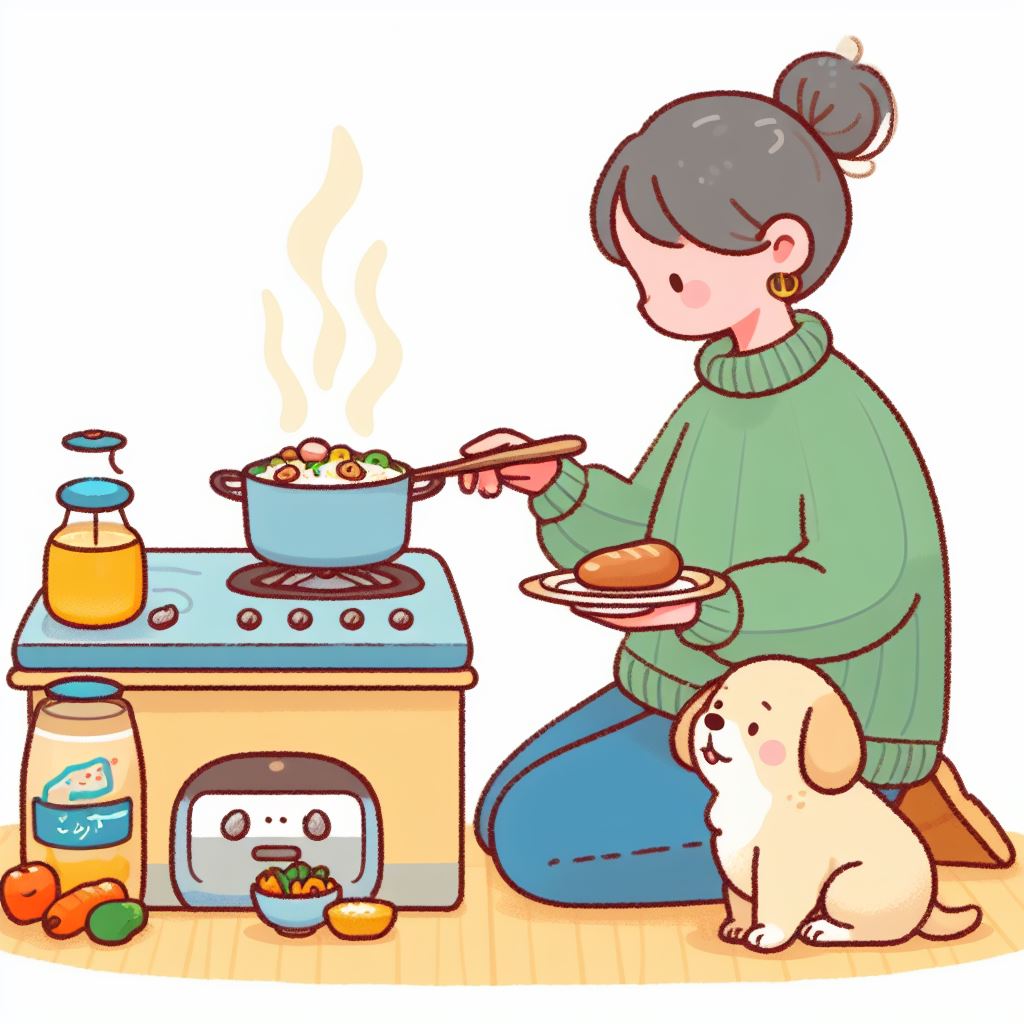If you're a pet parent or a soon-to-be one, you've probably noticed a buzz around homemade puppy food. Well, it's not just a fad; it's a growing movement that's got many dog lovers talking.
Now, we all want the best for our furry friends, and what they eat plays a big part in their health and happiness. That's where homemade puppy food steps into the picture. It's all about taking the reins of what goes into your pup's bowl and creating a diet to suit their specific needs.
So, let's dig deeper into this trend and explore the pros and cons of whipping up homemade meals for your growing pup.

Pros of Homemade Puppy Food:
Quality Control:
When you whip up homemade meals for your puppy, you get to handpick each ingredient, which is a fantastic opportunity to ensure that everything that goes into their bowl is top-notch. Think about it - you can go all-out and pick high-quality ingredients, maybe even organic ones. And let's face it, that's not something you can always guarantee with store-bought kibble.
You can source locally grown veggies and grains, ensuring they're fresh and packed with nutrients. You can see and feel the ingredients, checking their quality, and you know that would give you peace of mind.
Customisation:
Homemade puppy food is all about giving them the right diet in terms of nutrition. Different breeds, sizes, and ages have unique dietary requirements. If you've got a tiny Chihuahua, their nutritional needs are quite different from a robust Labrador. Homemade food lets you cater to those specific needs.
Let's say you've got a Labrador Retriever puppy, known for their boundless energy. You can create a diet to support their active lifestyle. With locally available proteins like lean chicken or mutton and a mix of whole grains and fresh vegetables, you're giving them a meal that's designed to keep their high energy levels, well, high!
Transparency:
One thing we all want for our pups is transparency in their food. When you make puppy meals at home, you're in control of where your ingredients come from. You know what's going into their food bowl, and there's no hidden business. This transparency can be a game-changer. You can avoid those mysterious additives or preservatives that sometimes lurk in commercial dog food.
Imagine this - you're using fresh, locally sourced ingredients from your neighbourhood market. It's the kind of trust you can't put a price on, knowing you're providing your pup with pure goodness.
Freshness:
Nothing beats the taste and nutrition of fresh ingredients, and your pup will agree wholeheartedly. When you're cooking up homemade puppy food, you're offering them a meal that's as fresh as a mother's homecooked food.
Think about it – you can use fresh chicken or fish from the local market, and even incorporate seasonal veggies that are packed with flavour and nutrients. The freshness isn't just about taste; it's about your puppy's overall health and vitality. It's like giving them a burst of energy in every bite.

Cons of Homemade Puppy Food:
Time-Consuming:
Now cooking for your pup can be a bit of a time commitment. It's not just about tossing a scoop of kibble into a bowl; you're preparing a meal from scratch. In the midst of our busy lives, finding those extra minutes in the kitchen can be challenging.
However, there are ways to make this less daunting. Consider preparing larger batches and freezing portions to save time on busy days, or ask for help from your friends and family.
Balancing Nutrients:
Balancing nutrients can be a bit tricky when you're cooking homemade puppy food. You've got to make sure your pup gets the right mix of proteins, carbohydrates, vitamins, and minerals. You have to be your pup's nutritionist.
For getting it right, consulting a veterinarian or a pet nutritionist is vital. They can provide guidance and recommend specific supplements if necessary, so that your pup's diet is well-rounded and wholesome. For example, if you're feeding a homemade diet to a large breed puppy, they might need extra calcium to support their growing bones.
Expense:
Now, let's talk money. Preparing homemade puppy food with high-quality ingredients can be a tad more expensive than buying commercial dog food off the shelf. But it's a trade-off for the quality and control you gain. Here's the deal – you're investing in your pup's health and longevity.
To make it more budget-friendly, consider buying ingredients in bulk, looking out for local deals, and minimizing food wastage by using leftovers creatively. Strike a balance between quality and cost, which, in the long run, is an investment in your furry buddy's health.
Health Risks:
Safety is paramount when making homemade puppy food. The risk of foodborne illnesses can't be ignored. If not prepared and stored properly, homemade meals can harbor harmful bacteria that could affect your pup's health.
To dodge these pitfalls, make sure to follow hygienic food preparation practices rigorously. Keep raw meats separate from other ingredients, and ensure proper cooking or handling to kill any potential pathogens. Be vigilant and avoid common mistakes, like undercooking meat or using ingredients that can be toxic to dogs.
Since our climate varies greatly from region to region, it's crucial to be mindful of food storage, especially during hot and humid seasons, to prevent spoilage and contamination.
Guidelines for Safe Homemade Puppy Food:
Portion Sizes:
When it comes to feeding your pup, portion control is key. Puppies, like humans, have different calorie requirements based on their age, size, and activity level. You have to take note to not overfeed or underfeed your furry friend. You can use online puppy food calculators or consult your vet for specific portion recommendations.
Ingredient Safety:
Safety starts with the ingredients you use. It's important to choose ingredients that are safe and beneficial for your puppy. Avoid toxic foods like onions, garlic, grapes, and raisins, which can harm your pet. Opt for fresh, unprocessed, and locally sourced ingredients, such as rice, lean meats (chicken, mutton), and dog-friendly vegetables (carrots, spinach).
Dietary Recommendations:
Your puppy's dietary requirements change as they grow. For example, a puppy's diet will differ from that of an adult dog. Feeding them the right mix of nutrients to support their development is important.
Discuss your puppy's dietary needs with your veterinarian or a pet nutritionist. They can guide you on the correct balance of proteins, fats, and carbohydrates, as well as the need for specific vitamins and minerals. If the climate is more on the hotter side, consider adjusting your pup's diet to accommodate increased hydration needs.
Consulting a Veterinarian:
The importance of consulting a veterinarian cannot be stressed enough. Before transitioning to homemade puppy food, it's crucial to get their professional advice. A veterinarian can:
- Assess your puppy's specific dietary needs based on their breed, size, and age.
- Recommend necessary supplements or vitamins.
- Provide insights into potential food allergies or sensitivities your puppy might have.
- Help you establish a balanced diet plan for your pup's growth and development.
Since climatic conditions, local ingredients, and regional preferences vary widely, consulting a vet ensures you're making dietary choices that are ideal for your specific circumstances. Your vet will be your pup's best friend when it comes to keeping them healthy and happy.
If you're ready to whip up fresh homemade deliciousness for your pupster, check out Wagr's favourite recipes.











